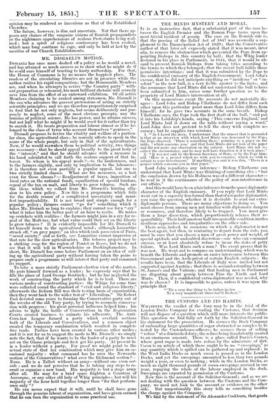THE MINTO MYSTERY AND MORAL.
IT is an instructive fact, that a substantial part of the case be- tween the English Premier and the Roman Pope turns upon the most trivial incident of gossip. The case on the Romish side is, that the passing of the Relief Act of 1847 was avowedly a sup- plement to the Emancipation Act of 1829; that the Conservative author of that later act expressly- stated that it was meant, inter alia, to remove the obstruction which prevented the Pope from ap- pointing Bishops in this country by bull ; that the Whig leader declared in his place in Parliament, in 1844, that it would be ab- surd to prevent Romish Bishops from taking titles according to the towns to which they belonged ; that the recent bull fulfils those permissive intentions ; and that it was submitted by the Pope to the confidential emissary of the English Government. Lord John's excuse, that he did not anticipate anything so "insidious" or "in- solent" as the new bull, is a very feeble answer to the facts ; and the assurance that Lord Minto did not understand the bull to have been submitted to him, raises some further question as to the propriety of Lord Minto's intervention at all. On this momentous event the accounts do not materially dis- agree: Lord John and Bishop Ullathorne do not differ from each other upon this particular point more than Lord John differs from himself; for he gave two accounts in the same breath. Bishop tillathorne says, the Pope took the first draft of the bull, "and put it into his Lordship's hands, saying 'This concerns England,' and Lord Minto laid it down on the table without saying a word." Lord John does not pretend to tell the story with complete ac- curacy ; but he supplies two versions.
1. "As I heard the story, I understand that the utmost that is pretended is that at an interview with which Lord Minto was honoured by the Pope, the Pope observed, 'There is something there,' pointing to a paper on the table, which concerns you,' and that Lord Minto did not look at the paper and did not make any observation on the subject. Lord Minto did not re- collect the circumstance, and he may well have forgotten it if it took place." 2. "it was not said by the Roman Secretary of State, or by the Pope him- self, 'Here is a project which we wish you to consider, which we wish to submit to your Government.' If anything was said it was this, There is a project winch concerns you in that paper.'"
Lord John repudiates any inference : Bishop tillathorne can understand that Lord Minto was thinking of something else ; "but the conclusion drawn by his Holiness was of a different character— he read in it the continuance of the policy of non-interference in our affairs."
And this would have been afair inference from the quasi-diplomatic character of the English emissary. If you reply that Lord Minto went out in a capacity less formal than that of a regular diplomatist, you raise the question, whether it is desirable to send out extra- aiplomatic persons. There are many objections to doing so. You must choose from among men not familiar with diplomatic dangers or resources, and therefore likely to be trapped. You must give them a large discretion, which proportionately relaxes their re- sponsibility. Their half-amateur half-irresponsible condition invites insidious approaches and irregularities on the other side. There may, indeed, be occasions on which a diplomatist is not the best agent, but then, in venturing to depart from the rule, you must be sure that you choose a man of great power and weight, of special aptitude and undoubted discretion—one who can command success, or at least absolutely refuse to incur the risks of petty failure. Was Lord Mint* such a man ? The event proves that he was not. He went out to compass an understanding which was to benefit the Liberals and promote an easier intercourse between this Government and the Arch-priest of certain English subjects : the results have been, that the Liberals of Italy were incited but not supported against Austria ; that there is misunderstanding between St. James's and the Vatican; and that leading men in Parliament are disputing about gossip between Pius the Ninth and Lord Minto. Then, if a confidential extra-diplomatist was needed, why was he chosen? It is impossible to guess, unless it was upon the principle that
" 'Tis a very fine thing to be father-in-law To a very magnificent thrce-tail'd Bashaw."


























 Previous page
Previous page